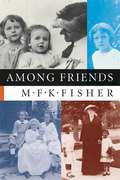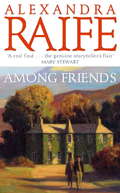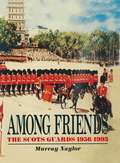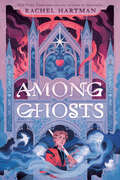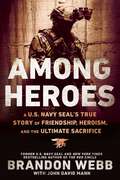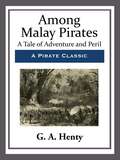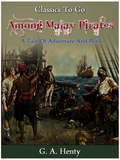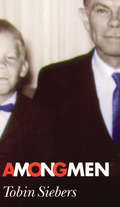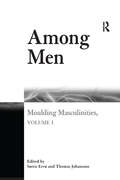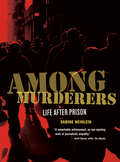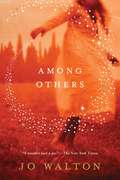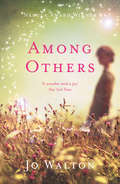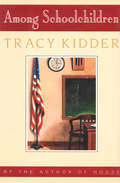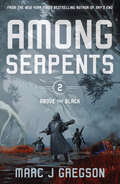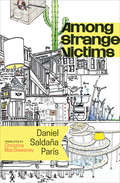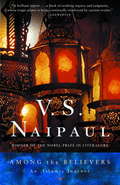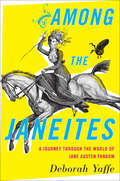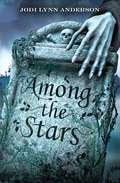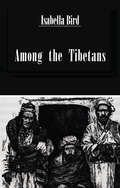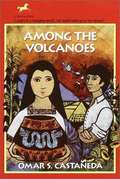- Table View
- List View
Among Friends
by M. F. K. Fisher"Among Friends," is M.F.K. Fisher's fascinating memoir of her childhood in Whittier, California. In sharing these memorable and moving portraits of her family and of the town, we are given an enchanting glimpse into the early life of one of our most delightful and best-loved writers.
Among Friends: A Novel
by Hal EbbottWhat begins as celebration gives way to betrayal, shattering the trust between two families&“Exquisitely crafted.&” —John Irving &“Masterly…Ranges from the most exquisite, Jamesian discriminations to the graspable, all-American solidities of Updike and Richard Yates. This is a writer to watch, with excitement and the highest expectations.' —John Banville&“Wonderful, sly and subtle…Every sentence keeps you hanging in the air, waiting for the next punch to the gut. Wow.&”—Miranda Cowley Heller "In the way that a forceful intelligence or an infectious voice or a fresh vision can alter how we observe and answer the world, Among Friends brought me into its cool environs and made me engage my days differently. It's no small accomplishment for a first novel, or for any novel." —Richard FordIt&’s an autumn weekend at a comfortable New York country house where two deeply intertwined families have gathered to mark the host&’s fifty-second birthday.Together, the group forms an enviable portrait of middle age. The wives and husbands have been friends for over thirty years, their teenage daughters have grown up together, and the dinners, games, and rituals forming their days all reflect the rich bonds between them.This weekend, however, something is different. An unforeseen curdling of envy and resentment will erupt in an unspeakable act, the aftermath of which exposes treacherous fault lines upon which they have long dwelt.Written with hypnotic elegance and molten precision, and announcing the arrival of a major literary talent, Hal Ebbott&’s Among Friends examines betrayal within the sanctuary of a defining relationship, as well as themes of class, marriage, friendship, power, and the things we tell ourselves to preserve our finely made worlds.
Among Friends: A sweeping tale that will take you from the depths of grief to the heights of happiness (Perthshire Cycle, Book 5)
by Alexandra RaifeWill she get through the hardest of times with the support of her friends?In the two years since the loss of her husband and twin daughters in a fatal car crash, Louise has avoided facing up to the full extent of her bereavement by caring for her husband's elderly great-aunt. But now Aunt Bea, too, is dead and Louise is robbed of both a dear friend and a home. Caring is what Louise does best, and - with the proviso that she will not work in households with children - she joins an agency that specialises in supplying temporary domestic help. The demands made upon her, and the homes in which she finds herself, are varied and occasionally bizarre, but in confronting them she makes friends and discovers self-confidence.But then circumstances beyond her control land her in the situation she dreads most . . .**************Readers are loving AMONG FRIENDS!'A fascinating and worthwhile read' - 5 STARS'Another book from Alexandra Raife that I didn't want to put down' - 5 STARS'A wonderful read' - 5 STARS
Among Friends: A sweeping tale that will take you from the depths of grief to the heights of happiness (Perthshire Cycle, Book 5)
by Alexandra RaifeWill she get through the hardest of times with the support of her friends?In the two years since the loss of her husband and twin daughters in a fatal car crash, Louise has avoided facing up to the full extent of her bereavement by caring for her husband's elderly great-aunt. But now Aunt Bea, too, is dead and Louise is robbed of both a dear friend and a home. Caring is what Louise does best, and - with the proviso that she will not work in households with children - she joins an agency that specialises in supplying temporary domestic help. The demands made upon her, and the homes in which she finds herself, are varied and occasionally bizarre, but in confronting them she makes friends and discovers self-confidence.But then circumstances beyond her control land her in the situation she dreads most . . .**************Readers are loving AMONG FRIENDS!'A fascinating and worthwhile read' - 5 STARS'Another book from Alexandra Raife that I didn't want to put down' - 5 STARS'A wonderful read' - 5 STARS
Among Friends: Stories from the Journey
by Jonathan Ryan Chas Allen Father Jim SichkoA priest&’s inspiring story of bringing people together and bringing them closer to God—with some help from Dolly Parton, Martin Short, and others. This book is my Midrash. With these words, Father Jim Sichko draws us into a life story full of laughter, tears, and service, filled with insightful lessons gained during his many travels as a clergyman and motivational speaker. Whether recounting his sobering flying experiences, the time he met the pope, or his encounter with the &“Weed Man,&” Father Jim instructs through powerful storytelling. As he takes us along on his journey, from getting kicked out of seminary to hosting celebrities—including Dolly Parton, Harry Connick Jr., Martin Short, and former first lady Laura Bush—at his small Kentucky parish, Father Jim shines a light into the corners of the human heart to expose our need for God and the love He alone can give. With humor and striking honesty, Father Jim reveals what it means to worship God, have compassion for others, and live life among friends.
Among Friends: The Scots Guards, 1956–1993
by Murray NaylorThis book provides a complete insight into the history of the Scots guards from 1956-1993.
Among Ghosts
by Rachel HartmanSet in the world of New York Times bestseller Seraphina, a boy on the run from a dragon—among other dangers—seeks refuge in a haunted abbey in this wholly original ghost story about what haunts us, and what connects us.A few things to know about the town of St. Muckle&’s: It&’s too out-of-the-way to interest greedy lords, and too damp and muddy for marauding dragons to burn. And anyone, from a humble serf to a runaway nun, may earn their freedom by living for a year and a day within the town walls. Seven years ago, Charl and his mother fled to St. Muckle&’s and made it their safe-haven, building a new life in this so called Peasant&’s Paradise. But when Charl sees something impossible—a ghost—soon the embers of his past are threatening to engulf his world in flame. A tragic accident is quickly followed by murder, a deadly plague, and a mercenary dragon. Charl manages to escape to an abandoned abbey outside of town, but finds no safety within those ruined walls. A treacherous nun, a chorus of murdered girls, and the fearsome Battle Bishop await, ready to ensnare him in a complex web of history, magic and fate. For some things should never be forgotten, however much they haunt us, and Charl will need all his wisdom and resiliency if he is to fight for the world he knows…and the people he calls home.Discover more critically-acclaimed fantasy from Rachel Hartman!SeraphinaShadow ScaleTess of the Road
Among Ghosts
by Rachel HartmanSet in the world of New York Times bestseller Seraphina, a boy on the run from a dragon — among other dangers — seeks refuge in a haunted abbey in this wholly original YA ghost story about what haunts us, and what connects us.A few things to know about the town of St. Muckle's: It's too out-of-the-way to interest greedy lords, and too damp and muddy for marauding dragons to burn. And anyone, from a humble serf to a runaway nun, may earn their freedom by living for a year and a day within the town walls. Seven years ago, Charl and his mother fled to St. Muckle's and made it their safe-haven, building a new life in this so-called Peasant's Paradise. But when Charl sees something impossible — a ghost — soon the embers of his past are threatening to engulf his world in flame. A tragic accident is quickly followed by murder, a deadly plague, and a mercenary dragon. Charl manages to escape to an abandoned abbey outside of town, but finds no safety within those ruined walls. A treacherous nun, a chorus of murdered girls, and the fearsome Battle Bishop await, ready to ensnare him in a complex web of history, magic, and fate. For some things should never be forgotten, however much they haunt us, and Charl will need all his wisdom and resiliency if he is to fight for the world he knows . . . and the people he calls home.Discover more critically acclaimed fantasy from Rachel Hartman!SeraphinaShadow ScaleTess of the RoadIn the Serpent's Wake
Among Heroes
by John David Mann Brandon WebbNow from Brandon Webb, Navy SEAL sniper and New York Times bestselling author, comes his personal account of the eight friends and fellow SEALs who made the ultimate sacrifice. "Knowing these great men--who they were, how they lived, and what they stood for--has changed my life. We can't let them be forgotten. So read about these amazing men, share their stories, and learn from them as I have. We've mourned their deaths. Let's celebrate their lives."--Brandon WebbAs a Navy SEAL, Brandon Webb rose to the top of the world's most elite sniper corps, experiencing years of punishing training and combat missions from the Persian Gulf to Afghanistan. Among the best of the best, he led the SEALs' clandestine sniper training program as course manager, instructing a new generation of the world's top snipers. Along the way, Webb served beside, trained, and supported men he came to know not just as fellow warriors, but as friends and, eventually, as heroes. Among Heroes gives his personal account of these eight extraordinary SEALs, who gave all for their comrades--and their country.Here are the true stories behind the remarkable valor and abiding humanity of those "sheepdogs" (as they call themselves) who protect us from the wolves of the world. Of Matt "Axe" Axelson, who perished on the Lone Survivor mission in Afghanistan. Of Chris Campbell, Heath Robinson, and JT Tumilson, who were among the thirty-eight casualties of Extortion 17, the Chinook helicopter shot down in August 2011. Of Glen Doherty, Webb's best friend for more than a decade, killed while helping secure the successful rescue and extraction of American CIA and State Department diplomats in Benghazi, Libya, on September 11, 2012; and other close friends, classmates, and fellow warriors.In Among Heroes, Webb offers eight intensely personal profiles of uncommon courage--who these men were, what they stood for, and how they came to make the ultimate sacrifice. These are men who left behind powerfully instructive examples of what it means to be alive--and what it truly means to be a hero.INCLUDES PHOTOS
Among Malay Pirates
by G. A. HentyAmong Malay Pirates is a story of courage and danger. Join our heroes as they pit themselves against blood thirsty pirates and epic sea storms. A magnificent swashbuckling story of a grander more adventurous time.
Among Malay Pirates: A Tale of Adventure and Peril (Classics To Go)
by G. A. HentyG.A. Henty was a prolific writer of historical fiction for young adults. In this story we get a taste how it might have been, if you'd ever got captured by Malay Pirates.
Among Men
by Tobin Siebers"The tone is personal, the subject matter timely and contemporary. At turns moving, funny, poignant, and haunting, Among Men is an insightful diary about talking man to man."—Voice Literary Supplement
Among Men: Moulding Masculinities, Volume 1
by Thomas Johansson Søren ErvøThe two 'Moulding Masculinities' volumes represent the first major publication in English of Northern European studies on masculinities. They focus on men’s relationships towards each other and their bodies, primarily from psycho-dynamic and social constructionist perspectives. The contributors are drawn from disciplines as diverse as sociology, social anthropology, media studies and sports sciences, and include scholars from Denmark, Sweden, Norway, Finland, The Netherlands, Germany, Australia, the UK and the USA. Investigating the relational aspects of masculinity, this volume describes how different masculinities are moulded within diverse structures and settings. It explores how men interact with each other and how they collectively react to and embody changing concepts of masculinity. By centering on the struggle and negotiation between different groups and discourses of masculinity and investigating the origin of dominant images and ideals of masculinity, these two volumes will widen international understanding of how historic forms of masculinity are interpreted, revived and combined in the process of moulding masculinities.
Among Murderers: Life After Prison
by Sabine HeinleinWhat is it like for a convicted murderer who has spent decades behind bars to suddenly find himself released into a world he barely recognizes? What is it like to start over from nothing? To answer these questions Sabine Heinlein followed the everyday lives and emotional struggles of Angel Ramos and his friends Bruce and Adam--three men convicted of some of society's most heinous crimes--as they return to the free world. Heinlein spent more than two years at the Castle, a prominent halfway house in West Harlem, shadowing her protagonists as they painstakingly learn how to master their freedom. Having lived most of their lives behind bars, the men struggle to cross the street, choose a dish at a restaurant, and withdraw money from an ATM. Her empathetic first-person narrative gives a visceral sense of the men's inner lives and of the institutions they encounter on their odyssey to redemption. Heinlein follows the men as they navigate the subway, visit the barber shop, venture on stage, celebrate Halloween, and loop through the maze of New York's reentry programs. She asks what constitutes successful rehabilitation and how one faces the guilt and shame of having taken someone's life. With more than 700,000 people being released from prisons each year to a society largely unprepared--and unwilling--to receive them, this book provides an incomparable perspective on a pressing public policy issue. It offers a poignant view into a rarely seen social setting and into the hearts and minds of three unforgettable individuals who struggle with some of life's harshest challenges.
Among Others
by Jo WaltonWinner of the Hugo and Nebula Awards for Best Novel. Startling, unusual, and yet irresistibly readable, Among Others is at once the compelling story of a young woman struggling to escape a troubled childhood, a brilliant diary of first encounters with the great novels of modern fantasy and SF, and a spellbinding tale of escape from ancient enchantment.<P><P> Raised by a half-mad mother who dabbled in magic, Morwenna Phelps found refuge in two worlds. As a child growing up in Wales, she played among the spirits who made their homes in industrial ruins. But her mind found freedom and promise in the science fiction novels that were her closest companions. Then her mother tried to bend the spirits to dark ends, and Mori was forced to confront her in a magical battle that left her crippled -- and her twin sister dead.<P> Fleeing to her father whom she barely knew, Mori was sent to boarding school in England-a place all but devoid of true magic. There, outcast and alone, she tempted fate by doing magic herself, in an attempt to find a circle of like-minded friends. But her magic also drew the attention of her mother, bringing about a reckoning that could no longer be put off...<P> Combining elements of autobiography with flights of imagination in the manner of novels like Jonathan Lethem's The Fortress of Solitude, this is potentially a breakout book for an author whose genius has already been hailed by peers like Kelly Link, Sarah Weinman, and Ursula K. Le Guin.<P> One of School Library Journal's Best Adult Books 4 Teens titles of 2011. One of io9's best Science Fiction & Fantasy books of the year 2011.
Among Others: A Novel
by Jo Walton'It doesn't matter. I have books, new books, and I can bear anything as long as there are books.'Fifteen-year-old Morwenna lives in Wales with her twin sister and a mother who spins dark magic for ill. One day, Mori and her mother fight a powerful, magical battle that kills her sister and leaves Mori crippled. Devastated, Mori flees to her long-lost father in England. Adrift, outcast at boarding school, Mori retreats into the worlds she knows best: her magic and her books. She works a spell to meet kindred souls and continues to devour every fantasy and science fiction novel she can lay her hands on. But danger lurks... She knows her mother is looking for her and that when she finds her, there will be no escape.
Among Schoolchildren
by Tracy KidderThe Pulitzer Prize–winning author&’s classic, &“brilliantly illuminated&” account of education in America (TheNew York Times Book Review). Mrs. Zajac is feisty, funny, and tough. She likes to call herself an &“old-lady teacher.&” (She is thirty-four.) Around Kelly School, she is infamous for her discipline: &“She is mean, bro,&” says one of her students. But children love her, and so will the reader of this extraordinarily moving book by the Pulitzer Prize–winning author of House and The Soul of a New Machine. Tracy Kidder spent nine months in Mrs. Zajac&’s fifth-grade classroom in a depressed area of Holyoke, Massachusetts. Living among the twenty schoolchildren and their indomitable teacher, he shared their joys, catastrophes, and small but essential triumphs. His resulting New York Times bestseller is a revelatory and remarkably poignant account of an inner-city school that &“erupts with passionate life,&” and a close-up examination of what is wrong—and right—with education in America (USA Today). &“More than a book about needy children and a valiant teacher; it is full of the author&’s genuine love, delight and celebration of the human condition. He has never used his talent so well.&” —The New York Times
Among Serpents (Above the Black)
by Marc J GregsonStrap in for a high-octane mission that hurls Conrad and crew toward jaw-dropping discoveries that could trigger total obliteration, in Book Two of the Above the Black fantasy trilogy from the New York Times bestselling author of Sky's End.It takes guts to rise to the top of Meritocracy. It&’ll take sheer ruthlessness to stay there. As militants and monsters lay waste to the Skylands, Uncle&’s lawless tyranny threatens to unravel fragile Trade alliances. Conrad, no longer a mere Captain, now commands a squadron of ships at the order of the King. But Conrad&’s High status can&’t protect him from his own turmoil, and the price of power is steeped in blood.Tormented by tragedies of war and by betrayal from his own family, Conrad must prove his worth to all of the Skylands. Led by an unhinged Explorer, Conrad embarks on a secret expedition to turn the tides of battle—before another island falls at the jaws of the gigataun. It&’s a journey fraught with peril: Deadly monstrosities. Sabotage. Stowaways. And with friendships pushed to the brink and gentle romance stirring, Conrad will have to muster more than courage to weather the raging storms ahead.Order your copy of Book Two of the Above the Black trilogy and continue the adventure! Marc J Gregson expands his fast-paced fantasy universe with shocking twists, treacherous battles, and a memorable cast of characters. Fans of Frank Herbert and Jules Verne will appreciate touches of classic science fiction, including speculative frontiers and turbulent political intrigue.
Among Strange Victims
by Christina Macsweeney Daniel Saldaña París"His tools are brilliant syntax, the ability to achieve highly powerful, recurrent images, a set of relationships between the plot strands that are more than a forced structure, and humor, a corrosive humor that never leads to laughter, but is present in every phrase of the book, charged with relentless sardonic irony. "--Factorcritico "Daniel Saldaña París knows how to talk about those other tragedies populating daily life: a boring, unwanted marriage; mind numbing office work; family secrets. He builds on those bricks of tedium a greatly enjoyable and splendidly well-written suburban farce. ” --Yuri Herrera Rodrigo likes his vacant lot, its resident chicken, and being left alone. But when passivity finds him accidentally married to Cecilia, he trades Mexico City for the sun-bleached desolation of his hometown and domestic life with Cecilia for the debauched company of a poet, a philosopher, and Micaela, whose allure includes the promise of time travel. Earthy, playful, and sly, Among Strange Victims is a psychedelic ode to the pleasures of not measuring up. Daniel Saldaña París (born Mexico City, 1984) is an essayist, poet, and novelist whose work has been translated into English, French, and Swedish and anthologized, most recently in Mexico20: New Voices, Old Traditions, published in the United Kingdom by Pushkin Press. Among Strange Victims is his first novel to appear in the United States. He lives in Montreal, Quebec.
Among The Believers
by V. S. NaipaulNaipaul's controversial account of his travels through the Islamic world, hailed by The New Republic as "the most notable work on contemporary Islam to have appeared in a very long time."From the Trade Paperback edition.
Among The Janeites: A Journey Through the World of Jane Austen Fandom
by Deborah YaffeA “witty, irresistible” account of Jane Austen’s most zealously devoted fans and their lively literary community (Lan Samantha Chang, author of The Family Chao).They walk among us in their bonnets and Empire-waist gowns, clutching their souvenir tote bags and battered paperbacks: the Janeites, Jane Austen’s legion of devoted fans. Who are these obsessed admirers, whose passion has transformed Austen from classic novelist to pop-culture phenomenon? Deborah Yaffe, journalist and Janeite, sets out to answer this question, exploring the remarkable endurance of Austen’s stories, the unusual zeal that their author inspires, and the striking cross-section of lives she has touched.Along the way, Yaffe meets a Florida lawyer with a byzantine theory about hidden subtexts in the novels, a writer of Austen fan fiction who found her own Mr. Darcy while reimagining Pride and Prejudice, and a lit professor whose roller-derby nom de skate is Stone Cold Jane Austen. Yaffe goes where Janeites gather, joining a pilgrimage to historic sites in Britain, chatting online with fellow fans, and attending the annual ball of the Jane Austen Society of North America—in period costume. Part chronicle of a vibrant literary community, part memoir of a lifelong love, Among the Janeites is a funny, touching meditation on the nature of fandom.“[A] playful exploration of Austen obsession. . . . amusing and sometimes mind-boggling.” —Jane Smiley, The New York Times“Explores the dimensions of modern Jane-o-mania . . . Yaffe honors her hero throughout.” —Kirkus Reviews“Lively and insightful . . . Yaffe, who is ‘happiest when curled up alone with Persuasion,’ gamely dons period costume, studies country dancing, and dives into Austen fan fiction to research this subculture.” —Publishers Weekly
Among The Shadows: A Detective Byron Mystery (The John Byron Novels #1)
by Bruce Robert CoffinMaine Sunday Telegram #1 Bestseller"A first-rate novel. Suspenseful and highly entertaining." -- New York Times bestselling author Gayle LyndsFall in Portland, Maine usually arrives as a welcome respite from summer’s sweltering temperatures and, with the tourists gone, a return to normal life—usually. But when a retired cop is murdered, things heat up quickly, setting the city on edge.Detective Sergeant John Byron, a second-generation cop, is tasked with investigating the case—at the very moment his life is unraveling. On the outs with his department’s upper echelon, separated from his wife, and feeling the strong pull of the bottle, Byron remains all business as he tries to solve the murder of one of their own. And when another ex-Portland PD officer dies under suspicious circumstances, he quickly realizes there’s much more to these cases than meets the eye. The closer Byron gets to the truth, the greater the danger for him and his fellow detectives.This taut, atmospheric thriller will appeal to fans of Michael Connelly and John Sandford.
Among The Stars: Among The Stars (May Bird Ser. #2)
by Jodi Lynn Anderson Sammy Yuen Jr. Peter Ferguson Christopher GrassiMay Birdhas always been a bit. . . different. While most of her classmates were riding their bikes, she was running around the West Virginia woods, dressed as a warrior princess with her hairless cat at her side. And while most of her classmates were spending their summer vacations going to birthday parties, May was discovering a mysterious lake hidden among the trees -- and stumbling into the land of ghosts, the Ever After. A fearful and fantastic realm located among the stars, the Ever After is full of phantoms and poltergeists, ghouls and goblins, and all manner of things that go bump in the night. And if May is to find her way out again, she must reach the mysterious Lady of North Farm, who lives in a cold, forbidding land that even the spooks find spooky. With her courageous (yet melancholy) kitty and a ragtag group of spectral friends she's picked up along the way, May is determined to escape the Afterlife. But her travels will bring her face-to-face with her worst fears: a devious pursuer; a truly horrifying dance party under the sea, hosted by the Bogey (aka Boogie) Man; and the Ever After's terrible ruler, Evil Bo Cleevil. And when all of these things collide, there's no telling who will find courage to make it through. . . or who will be left behind.
Among The Tibetans
by Isabella BirdThis little know gem by the doyenne of women travellers in the East describes a journey on horseback through the Himalayas and into Tibet, where she spent four months. Enchanted by the Tibetans who she found the 'pleastest of people', Bird's is a delightful account of a land of beauty and mystery, encircled by high mountains of vermillion and purple. Among the most striking passages are those that describe the religion of Tibet, which permeated the very atomosphere with a singular sense of strange of otherworldly. Bird visited the palaces, temples and monasteries and her description of the ceremonies, decorations, costumes and music capture a world that is now lost for all time. First published in 2001. Routledge is an imprint of Taylor & Francis, an informa company.
Among The Volcanoes
by Omar CastañedaIsabel Pascay longs to go to school and become a teacher, but her dream just doesn't seem possible in the small Guatemalan village where she lives. The villagers expect Isabel to follow tradition and marry her boyfriend, handsome Lucas Choy. And her mother is ill, but resists Western medicine, relying on a local healer. As the eldest daughter, all the family burdens seem to fall on Isabel. Can she hold on to her dreams for the future and achieve her goal?
